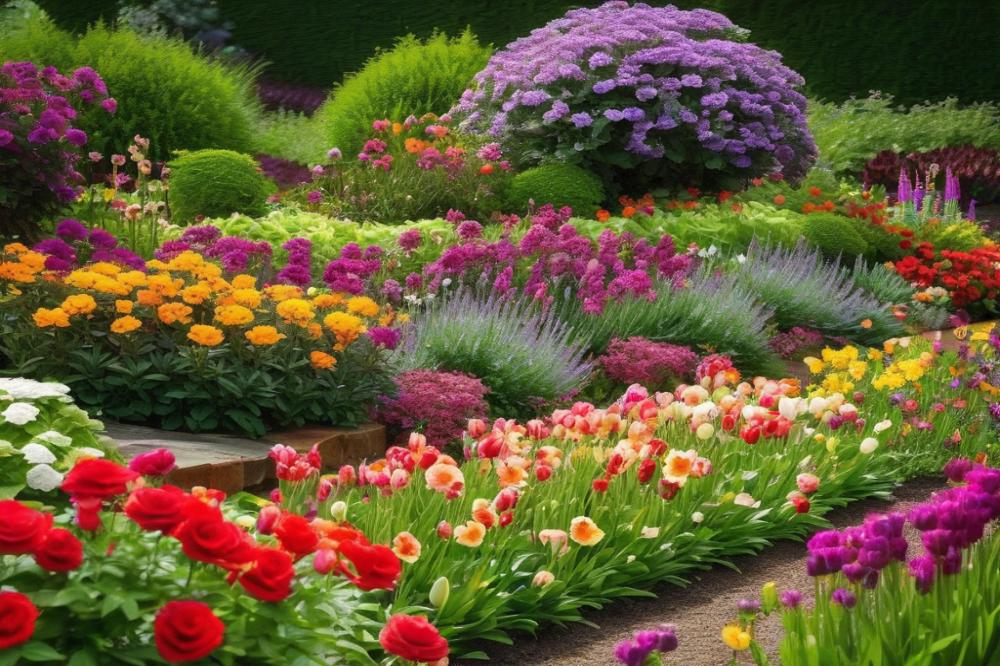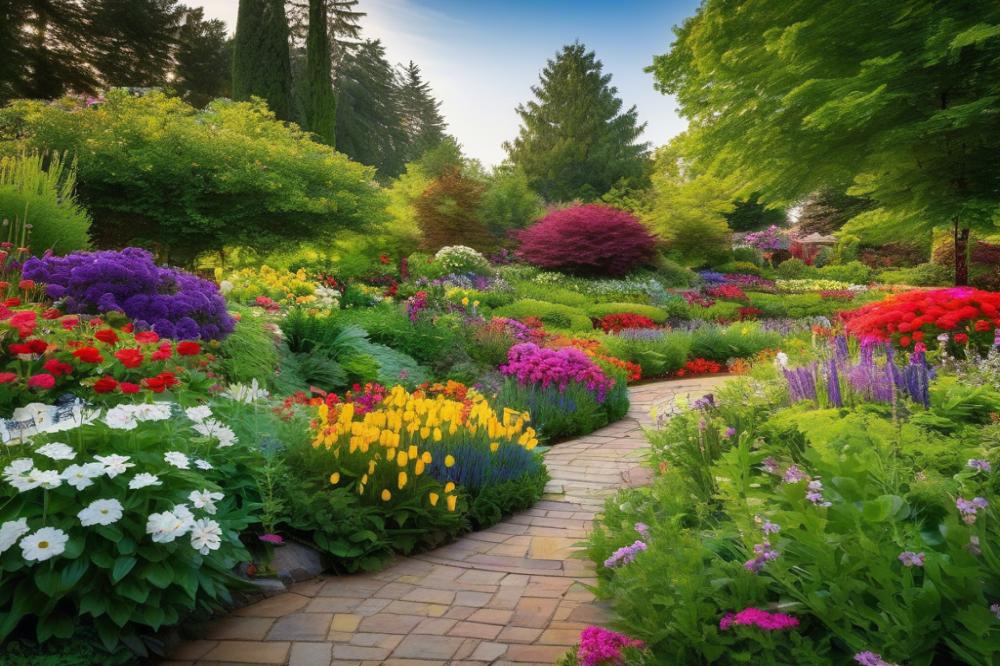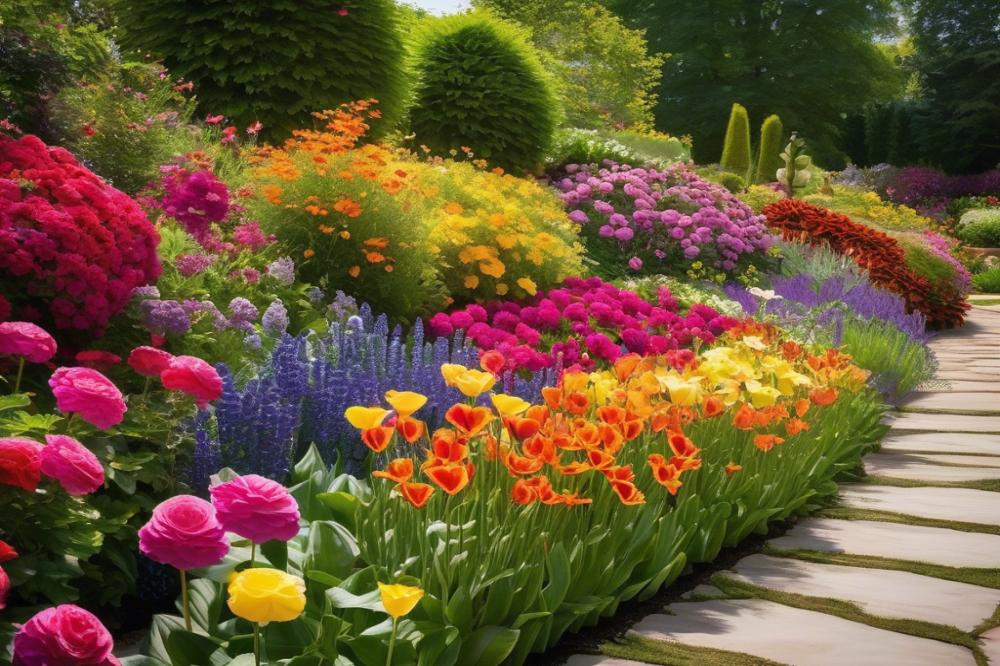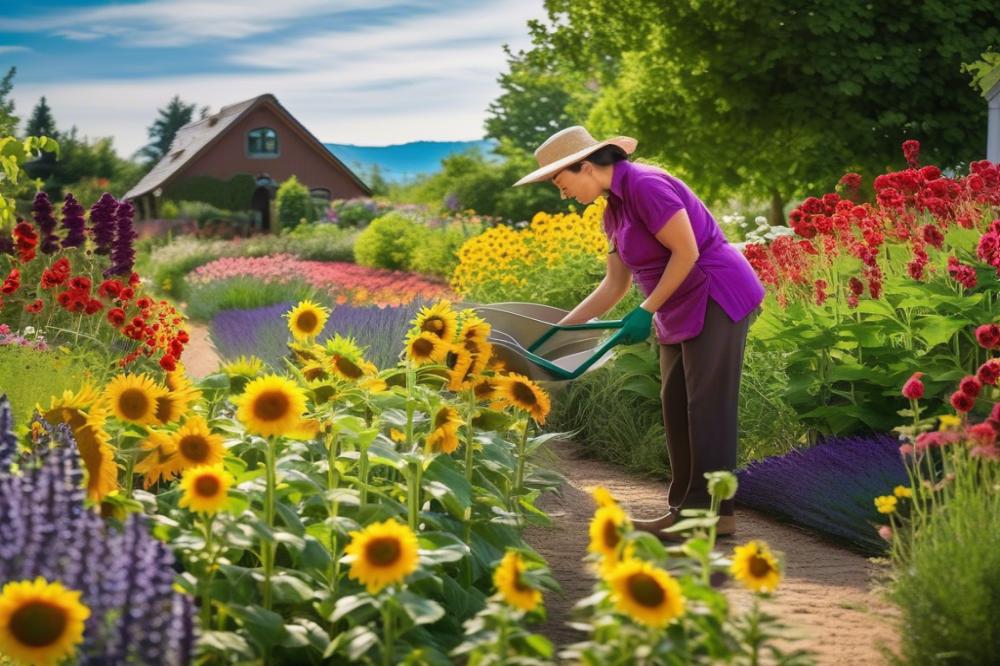The Role of Organic Gardening in Flower Care
flower gardens play a crucial role in enhancing both aesthetics and the environment. Vibrant blooms not only bring joy to our lives but also provide habitats for countless creatures. A well-kept garden can transform a simple yard into a beautiful haven for both people and wildlife. The colors and fragrances create an inviting atmosphere, making it a delightful place for relaxation and reflection.
Organic Gardening offers a sustainable approach to Flower Care, proving to be beneficial for both flower growth and soil health. By utilizing eco-friendly practices, gardeners can create a thriving environment for their plants. Emphasizing native plants in these spaces can boost biodiversity and make gardens more resilient to pests and diseases. This strategy promotes a balanced ecosystem that flourishes without relying on harmful chemicals.
Organic fertilizers are one of the sustainable practices that can significantly enhance soil health. These natural alternatives nourish plants while improving the overall quality of the soil. Additionally, pest management can be accomplished through natural means, such as introducing beneficial insects that keep harmful ones at bay. Techniques like companion planting can further support this effort, allowing certain plants to thrive together while repelling pests naturally.
Another notable benefit of organic gardening lies in its support for pollinator-friendly gardens. Flowers that attract bees and butterflies not only enhance beauty but also contribute to the overall health of the environment. By providing a welcoming space for these essential pollinators, gardeners can help ensure a thriving ecosystem. Gardening tips that focus on attracting wildlife can lead to more productive and beautiful gardens.
Choosing the right plants is vital for ensuring a successful flower garden. Look for hardy varieties that can withstand local conditions. Over time, these practices contribute to a lush landscape that captivates the eye while supporting a diverse range of life. Embracing the principles of organic gardening can result in stunning displays of nature’s beauty, all while fostering a healthier planet.
Understanding Organic Gardening


Organic gardening focuses on cultivating plants without synthetic chemicals. This practice is based on several principles, including building healthy soil, promoting biodiversity, and using natural methods for pest management. Unlike conventional gardening, which often relies on artificial fertilizers and pesticides, organic techniques favor eco-friendly alternatives.
sustainable practices are essential in this type of gardening. They aim to maintain a balanced ecosystem where plants, insects, and soil work together. Healthy soil plays a vital role in this process. It provides essential nutrients to flowers and helps retain moisture, allowing for better flower growth.
Natural fertilizers are commonly used, such as compost and manure. These organic fertilizers enrich the soil without harming the environment. Instead of spraying harmful chemicals, gardeners might turn to companion planting. This strategy involves growing certain plants together to deter pests and encourage beneficial insects.
Pollinator-friendly practices are also crucial for a thriving garden. By planting a variety of native plants, gardeners can attract bees and butterflies. These creatures support the health of the garden and enhance its beauty. By prioritizing these ecological strategies, flower gardens become vibrant spaces filled with life.
Gardening tips are plentiful for those interested in these methods. Knowing how to nurture flowers organically can be rewarding. It’s more than just growing plants; it’s about creating a harmonious environment. This approach results in healthier flowers and contributes to the planet’s well-being.
Soil Health and Its Impact on Flower Growth


Soil health is crucial in the world of gardening. This aspect directly influences how well flowers thrive. Healthy soil means better nutrient availability and good drainage, both essential for robust growth. Organic gardening emphasizes the importance of maintaining soil vitality.
Organic matter plays a key role in enhancing soil quality. It can come from various sources, including decomposed leaves and kitchen scraps. Adding compost enriches the soil, making it more fertile. This practice encourages the development of beneficial microorganisms. These microbes help plants absorb nutrients more effectively.
Compost also improves soil structure. When soil is well-structured, it retains moisture and allows for proper aeration. Roots need space to grow, and good soil helps support root systems. The blend of air and moisture creates an ideal environment for flower growth.
Utilizing native plants is another effective method to foster healthy soil. These plants are adapted to local conditions and require less water and care. They also attract native pollinators, which play a vital role in flowering plants’ reproduction. Planting native species can enhance the overall health of the garden ecosystem.
In addition to native plants, employing eco-friendly practices can lead to successful gardening experiences. Utilizing organic fertilizers, for example, supports the nutrient needs of flowers without harmful chemicals. Many gardeners also follow integrated pest management techniques. These methods minimize pest issues while protecting beneficial insects and soil health.
Companion planting is yet another strategy that benefits both soil and flowers. Pairing certain plants can enhance growth and deter pests. This method allows for a vibrant garden filled with a variety of flowering species. Each flower can contribute to the overall balance of nutrients in the soil.
Gardening tips often stress the importance of maintaining soil moisture. Regular watering and mulching can help prevent soil from drying out. This practice not only reduces the risk of drought stress but also protects the delicate soil structure.
Achieving a thriving garden involves understanding and nurturing soil health. A robust soil ecosystem promotes strong flower growth. By incorporating sustainable practices, gardeners can create beautiful, lively spaces. Taking these steps builds a resilient garden that benefits both plants and the environment.
Organic Fertilizers and Their Benefits


Using organic fertilizers can significantly enhance flower care. These natural products derive from plant and animal materials. As a result, they provide an array of nutrients essential for healthy plant growth. Different types of organic fertilizers exist, each with its own set of advantages.
Composted materials are quite popular. They enrich the soil with nutrients and improve its structure. Compost retains moisture and encourages the development of beneficial microorganisms. Additionally, seaweed extracts deliver trace minerals that promote strong flower growth. Fish emulsion serves as another option, offering a fast-acting source of nutrients.
Better soil health is one of the key benefits of organic fertilizers. Utilizing these natural amendments helps balance nutrient levels over time. By doing so, the soil becomes more fertile and capable of supporting diverse plant life. Such practices contribute to sustainable gardening, promoting a thriving ecosystem.
When using organic fertilizers, the effects extend beyond just feeding the plants. These products help in pest management by fostering a balanced environment. For example, a healthy garden attracts pollinator-friendly insects and beneficial organisms that deter pests. The increased diversity from companion planting further boosts this effect, enhancing flower vitality.
Another essential aspect is that organic fertilizers are generally eco-friendly. They minimize the risk of chemical runoff, which can harm nearby water sources. By choosing native plants for a garden, you further support local wildlife. This approach creates a flourishing habitat while maintaining the soft beauty of flowers.
Gardening tips suggest observing plants closely for signs of nutrient deficiency. Yellowing leaves or stunted growth can indicate the need for additional nutrients. Regularly rotating between different types of organic fertilizers can keep plants energized without overwhelming the soil.
Gardeners can cultivate a successful flower garden by employing these methods. Organic fertilizers play a vital role in nurturing blooms while preserving the delicate balance of nature. By making these choices, you contribute to a healthier planet.
Pest Management in Organic Flower Gardening


Managing pests in flower gardens can be challenging but rewarding. Organic gardening aims to protect plants without harming the environment. Various eco-friendly solutions can promote healthy flowers while safeguarding beneficial insects.
Understanding soil health is fundamental. Healthy soil leads to robust plants that are better equipped to resist pests. Adding organic fertilizers enhances nutrients in the soil, supporting vibrant flower growth. Always choose fertilizers that are labeled as organic to ensure safety for both plants and pollinators.
Companion planting is a valuable strategy. By growing certain plants together, you can naturally repel pests. Marigolds, for instance, emit a scent that deters aphids and nematodes. Incorporating native plants in your garden can also attract helpful insects, creating a balanced ecosystem.
Another effective method is to utilize natural pest deterrents. Sprays made from neem oil or insecticidal soap can target specific pests while minimizing harm to beneficial organisms. Regular monitoring of your garden is critical. By inspecting leaves and stems, you can catch infestations early before they spread.
Gardening tips that focus on prevention are crucial. Keep your plants healthy with proper watering and sunlight. Stressed plants are more susceptible to pest attacks. Always remove dead foliage and weeds, as these can harbor pests and diseases.
Encouraging pollinator-friendly practices is essential for a successful garden. Bees and butterflies not only beautify the space but also aid in plant reproduction. By selecting a variety of flowers that bloom at different times, you can provide a continuous food source for these beneficial creatures.
Implementing sustainable practices in your flower garden creates a thriving environment. The goal is to build a garden that supports both plants and wildlife. Through careful pest management and a commitment to ecological balance, your flowers can flourish beautifully.
Companion Planting for Enhanced Flower Care
Companion planting is an age-old gardening technique that promotes the healthy growth of plants through strategic partnerships. This practice involves pairing certain flowers and vegetables to improve pest control and overall vigor. Many gardeners embrace these sustainable practices because they naturally create a balanced ecosystem.
When planning a flower garden, consider which plants grow well together. For example, marigolds are often planted alongside vegetables and other flowers. Their strong scent can deter pests like aphids and nematodes, which can harm delicate blooms. Another excellent pairing is between sunflowers and peas. Sunflowers attract beneficial insects that help manage pests while providing support for climbing peas.
Flower health significantly benefits from these thoughtful combinations. Certain plants can enhance soil health, boosting the nutrients available to their neighbors. For instance, legumes like clover or beans enrich soil with nitrogen, which is essential for flower growth. These plants release nutrients back into the soil as their roots decay, creating a more fertile environment for everything nearby.
Pollinator-friendly gardening is also a big advantage of companion planting. By including native plants in your arrangement, you can attract bees, butterflies, and hummingbirds. These creatures not only make your garden visually appealing but are essential for the reproduction of many flowering plants. Without these pollinators, your flowers may struggle to thrive.
For effective pest management, knowledge of companion plants is key. Some plants naturally repel harmful insects. For instance, garlic and chives can ward off aphids, beetles, and other pests. Using organic fertilizers alongside these partnerships can enrich your soil while maintaining an eco-friendly approach.
Incorporating companion planting into your flower care routine offers numerous benefits. Use these gardening tips to create an environment where flowers can flourish, pests are managed naturally, and pollinators can thrive. Finding the right combinations may take a little research, but your flowers will thank you for the effort.
Creating Pollinator-Friendly Flower Gardens
Pollinator-friendly gardening practices are essential for the health of our ecosystems. Bees, butterflies, and other pollinators play a crucial role in the reproduction of many flowering plants. Without them, flower growth would decline sharply, and the beauty of nature would suffer.
Planting a diverse range of native plants has significant benefits for these creatures. Native flowers are more suited to the local climate and soil health. They provide nectar and pollen that attract various species. For instance, flowers like coneflowers and milkweed attract not only bees but also monarch butterflies. Creating a garden with such plants can transform an average yard into a vibrant habitat.
Utilizing sustainable practices enhances the overall environment. Organic fertilizers promote healthier soil, allowing plants to thrive without chemical harm. Pest management becomes easier since diverse plants naturally deter pests. Companion planting is another effective method. For example, placing marigolds next to vegetable crops can repel harmful insects while attracting beneficial ones. These eco-friendly strategies not only support pollinators but also contribute to a healthy garden ecosystem.
When planning your garden, consider these gardening tips. Choose a variety of plants that bloom at different times throughout the growing season. This ensures a continuous food source for pollinators. In addition, limit the use of pesticides. Many of these chemicals are harmful to pollinators and can disrupt the balance of your garden.
Ultimately, a pollinator-friendly garden requires thoughtful choices. By understanding the needs of local wildlife, gardeners can create spaces that promote biodiversity. Such efforts lead to a thriving garden that benefits both flowers and the essential creatures that support life. Every step counts in fostering an inviting environment for pollinators. Through these practices, we can all contribute to a more vibrant world filled with life and color.
Gardening Tips for Successful Organic Flower Care
Choosing native plants is a great first step for flourishing flower growth. These varieties are already adapted to your local climate and soil conditions. They require less water and are more resilient to pests. Moreover, native plants attract beneficial insects, enhancing your garden’s ecosystem.
Maintaining soil health is essential for vibrant blooms. Start by testing your soil to understand its nutrient levels. Adding organic fertilizers like compost enriches the soil with vital nutrients. This, in turn, supports healthy root systems and encourages robust plants. Mixing in mulch can also improve moisture retention while suppressing weeds.
Pest management becomes easier through eco-friendly practices. Homemade sprays using ingredients like garlic or neem oil can deter unwanted insects without harming beneficial bugs. Companion planting provides a natural way to repel pests. By planting marigolds alongside your flowers, you can keep certain harmful insects at bay.
Using sustainable practices benefits both the garden and the environment. Consider creating a pollinator-friendly space. Planting a variety of flowering plants that bloom at different times attracts bees, butterflies, and other pollinators. This not only enhances the beauty of your garden but also boosts your flower production.
Lastly, remember that patience is key in gardening. Allow time for your flowers to bloom and thrive. Every garden is unique, and it may take a season or more to see the results of your efforts. With the right care and attention, you’ll create a vibrant space filled with stunning flowers.
Final Thoughts on Flower Care
Organic gardening plays a significant role in caring for flowers. This method goes beyond just nurturing plants; it fosters an entire ecosystem. Sustainable practices, like composting and crop rotation, contribute greatly to improving soil health. Healthy soil provides the necessary nutrients that flowers thrive on, leading to vibrant blooms.
Using natural fertilizers and pest control methods helps maintain balance in the garden. As a result, plants grow stronger and more resilient. Furthermore, organic gardening encourages the presence of beneficial insects. Bees and butterflies, essential to pollination, flourish in these environments. Their visitations not only enhance flower growth but also promote biodiversity.
Encouraging people to adopt these methods is vital for the future of gardening. Simple changes in how we tend to our plants can make a difference. Choosing organic means supporting nature and its delicate balance. The rewards are clear: a garden full of life, color, and beauty. By making thoughtful choices, we can create spaces that benefit both the flowers and the environment.



